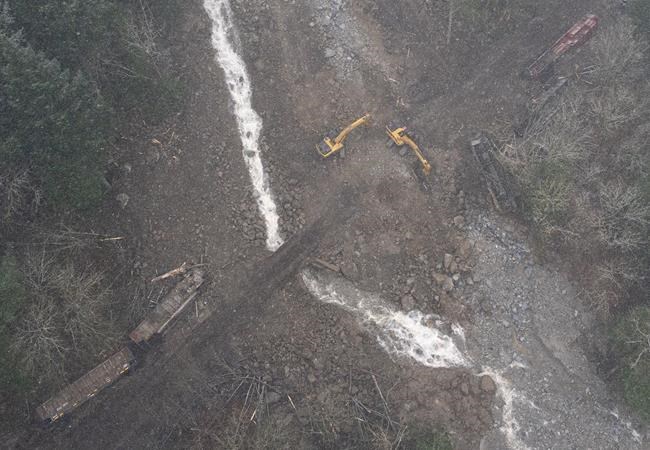MONTREAL — Amid growing backlogs, Canadian National Railway Co. trains are moving through southern British Columbia again after extensive flooding over the last three weeks.
CN said service resumed Sunday after crews worked around the clock on the Vancouver-Kamloops corridor, which was first cut by landslides and washouts caused by torrential downpours in mid-November.
The country's largest railroad operator restored limited activity along the vital supply link late last month before opting to close the line again a week ago as more storms triggered further mudslides and debris.
The damage to tracks and cars in dozens of spots followed floods that have caused bottlenecks for imports and exports on the West Coast.
"CN crews will continue to monitor both the rail infrastructure as well as the terrain over the coming days and weeks," CN spokesman Jonathan Abecassis said in an email.
The restored connection will allow freight to flow to and from the Port of Vancouver and begin to clear the massive backlogs of incoming shipping containers and outgoing grain.
The repaired lines will also allow Canadian Pacific Railway Ltd, which shares tracks with CN through part of the Fraser Valley, to boost its shipments.
End of year is a critical time for shipment of grain — canola and wheat in particular — with the bulk of Canadian grain transported via rail to B.C. ports.
Some can be diverted to Prince Rupert, B.C., the United States or Thunder Bay, Ont., but the window for the latter is nearly closed as winter ice looms, while rail cargo generally is hard to redirect en masse.
"There are a few trains that are trickling through, but we don't have rail movements up to where we need them to be," said Wade Sobkowich, executive director of the Western Grain Elevator Association.
"As far as a natural disaster goes, this is probably the most significant event ... to the rail lines in our collective memory."
Many farm deliveries to grain elevators have halted entirely as storage bins fill up and stakeholders await more detailed plans from the railways, Sobkowich said, adding he knows crews are working hard to ramp up traffic.
The backlog of Prairie grain may lose much of its value if trains can't ship it to port before spring, when prices typically drop amid heightened global supply, according to his association.
Contract extension penalties and demurrage fees — issued by a shipping line when freight exceeds the time allotted at a terminal — also present a threat for farmers and grain elevators trying to clear out brimming barns and silos.
"Regardless of when the traffic on the mainlines resume handling normal levels of traffic, the reverberations back through the grain supply chain in Western Canada (and all commodities) will be measured in months," Steve Pratte, policy manager at the Canadian Canola Growers Association, said in an email.
The number grain cars unloaded at West Coast ports dropped by 83 per cent year over year in the third week of November, according to the federal grain monitoring program's latest update.
As of Nov. 28, there were 24 grain vessels at berth or at anchor around the Port of Vancouver waiting for deliveries of up to 1.4 million tonnes of grain — mainly wheat, canola and barley — the update states.
"These shipments are critical to ensure that Canadian farms get the cash flow required to cover the operating costs accumulated through the season, and it is a race against winter every year to try and get as much grain to port before winter conditions settle in," Geoff Backman, markets manager at the Alberta Wheat and Barley Commissions, said in a statement.
Many cargo ships are also hampered from unloading their freight, and shipping containers are rushed back to Asia empty, says the Canadian Manufacturers and Exporters.
The number of empty cans through October was up 72 per cent from a year ago while exports were down 11 per cent, according to Vancouver-based GCT Global Container Terminals Inc.
Other commodities are affected by the severe weather as well. Teck Resources Ltd. said Monday that fourth-quarter coal sales could be as much as 24 per cent below expectations due to rail shipment disruptions in B.C.'s Lower Mainland.
Teck will be able to recover much of the delayed sales in the first half of 2022, added the company, which has diverted shipments to the Port of Prince Rupert.
If wildfires, flooding and mudslides continue to increase amid the cascading effects of climate change, Canada's reputation as a reliable supplier could weaken, Sobkowich said.
"If you're a customer in the world and you need product for your mill or your processing facility, you need certainty of supply," he noted, adding that strikes and rail blockades also factor in.
"If they've contracted to receive grain and they don't receive that grain, then it disrupts their ability to produce their products and it impacts their profitability. So they end up looking for sources elsewhere."
— With files from Craig Wong
This report by The Canadian Press was first published Dec. 6, 2021.
Companies in this story: (TSX:CNR, TSX:CP)
Christopher Reynolds, The Canadian Press



